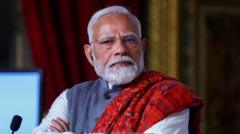The anticipated meeting between Indian Prime Minister Narendra Modi and U.S. President Donald Trump this week is set to cover a variety of pressing topics including tariffs, trade dynamics, and technological collaboration. The two leaders have shared a cordial bond, strengthened over the years through high-profile meetings and public appearances, notably at joint rallies in Houston and Ahmedabad.
While the personal rapport between Modi and Trump is undeniable, the upcoming talks may reveal a more transactional side of the relationship as both leaders come prepared with specific demands. As Modi gears up for his discussions, he has signaled a willingness to lower tariffs, address the issue of undocumented Indian immigrants, and increase imports of American oil—an effort to mitigate any potential tensions with the Trump administration.
The bilateral trade between the U.S. and India has been a focal point, especially given the $46 billion trade deficit favoring India. While Trump may push for further tariff reductions, Modi might respond with a call for a bilateral economic partnership to facilitate trade. Recent trends indicate Delhi's growing openness to pursuing trade agreements, especially with Trump's administration compared to that of Biden, which has imposed stricter conditions.
Modi may also find himself addressing the sensitive issue of undocumented Indian immigrants; estimates suggest that there are over 700,000 such individuals in the U.S. Additionally, calls for India to invest in American oil are expected as Washington navigates changing dynamics in global oil markets post-Ukraine invasion.
On the energy front, Modi may advocate for investments in India's nuclear energy sector, which aligns with India’s goals to meet its renewable energy needs by 2030. The leaders will potentially also discuss technology transfers under the Initiative on Critical and Emerging Technologies (iCET), pursued since the Biden era, aimed at enhancing India’s role in global supply chains, particularly in countering China.
Modi's agenda may extend to addressing the H-1B visa program, critical for Indian tech talent, amidst concerns from some of Trump's supporter base that could affect its future. Moreover, potential implications of foreign policy issues like U.S. actions toward Iran and Modi's stance on the wars in Ukraine and Gaza could also feature in the conversation.
Despite the delicate subjects on the table, both leaders are likely to maintain a cooperative tone, with the Indo-Pacific Quad alliance serving as a cornerstone of their discussions. As the leaders prepare to engage in a blend of camaraderie and critical negotiations, the outcomes of their meetings could have significant implications for both nations moving forward.
While the personal rapport between Modi and Trump is undeniable, the upcoming talks may reveal a more transactional side of the relationship as both leaders come prepared with specific demands. As Modi gears up for his discussions, he has signaled a willingness to lower tariffs, address the issue of undocumented Indian immigrants, and increase imports of American oil—an effort to mitigate any potential tensions with the Trump administration.
The bilateral trade between the U.S. and India has been a focal point, especially given the $46 billion trade deficit favoring India. While Trump may push for further tariff reductions, Modi might respond with a call for a bilateral economic partnership to facilitate trade. Recent trends indicate Delhi's growing openness to pursuing trade agreements, especially with Trump's administration compared to that of Biden, which has imposed stricter conditions.
Modi may also find himself addressing the sensitive issue of undocumented Indian immigrants; estimates suggest that there are over 700,000 such individuals in the U.S. Additionally, calls for India to invest in American oil are expected as Washington navigates changing dynamics in global oil markets post-Ukraine invasion.
On the energy front, Modi may advocate for investments in India's nuclear energy sector, which aligns with India’s goals to meet its renewable energy needs by 2030. The leaders will potentially also discuss technology transfers under the Initiative on Critical and Emerging Technologies (iCET), pursued since the Biden era, aimed at enhancing India’s role in global supply chains, particularly in countering China.
Modi's agenda may extend to addressing the H-1B visa program, critical for Indian tech talent, amidst concerns from some of Trump's supporter base that could affect its future. Moreover, potential implications of foreign policy issues like U.S. actions toward Iran and Modi's stance on the wars in Ukraine and Gaza could also feature in the conversation.
Despite the delicate subjects on the table, both leaders are likely to maintain a cooperative tone, with the Indo-Pacific Quad alliance serving as a cornerstone of their discussions. As the leaders prepare to engage in a blend of camaraderie and critical negotiations, the outcomes of their meetings could have significant implications for both nations moving forward.


















